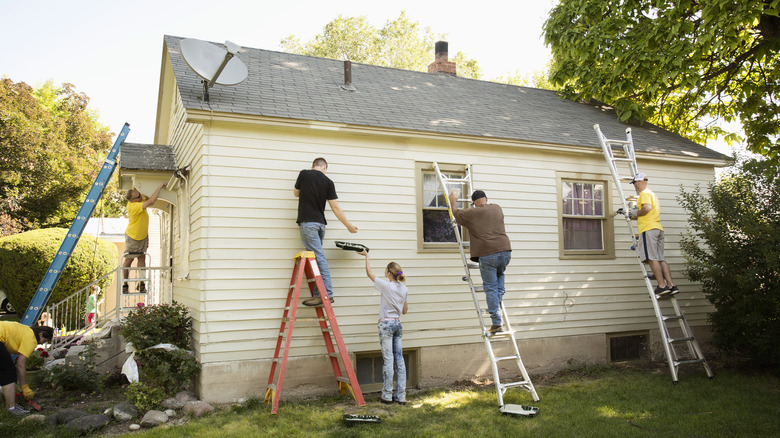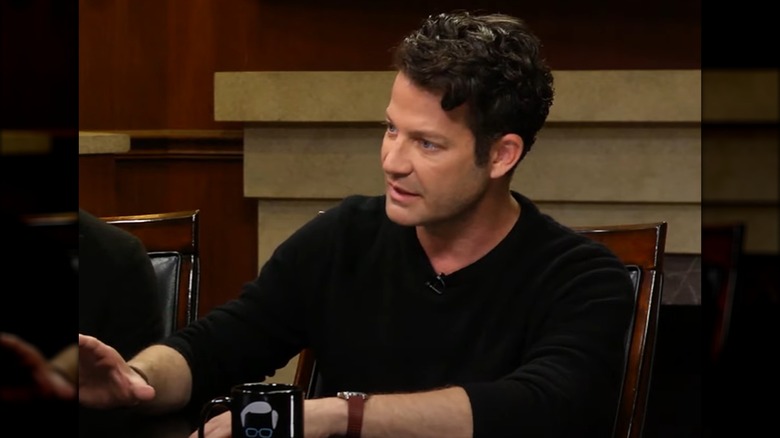The Negative Effect HGTV Trends Can Have On You And Your Home
Everyone loves a good HGTV binge, and seeing what the network's stars deem as trendy often serves as inspo for homeowners. However, getting too caught up in HGTV trends could actually do more harm than good, in some instances. As noted by a 2022 Bucknell University study, HGTV trends often prompt homeowners to feel ill at ease in their own homes, constantly agonizing over their next big project.
There's no question that home design trends often stifle personal creativity — and that's a shame. After all, as the study's authors, Annetta Grant and Jay M. Handelman, pointed out in their abstract, "Traditionally, the home is regarded as a place of singularization that is to be aligned with the homeowner's unique identity." Trends have always been around, of course, so that's not to say solely HGTV is at fault. However, as Grant said in an interview for Bucknell University's website, home improvement shows often see hosts mock participants for their pre-makeover "missteps," and that paves the way for even less creativity.
Speaking to The Washington Post, Grant pointed out that the viewers in the study internalized the criticisms leveled at participants on HGTV shows. "It really makes people feel quite uneasy about the decisions that they make in their home, and so they're always kind of fearful about getting it wrong," she explained. Cue, homes people don't feel especially connected to.
Trends are expensive and wasteful (and date your home)
Personalization aside, another negative outcome of prioritizing trends seen on HGTV is that it sets homeowners up for constant renovations and home improvement projects, all in the name of keeping up to date with current fashions. However, trying to cram too many design trends into a home is a big mistake.
For starters, as one interior designer who spoke to The Washington Post about the Bucknell University study explained, there's a big chance things will end up looking dated at some point. "It is a trend, and it will go out of style," Bona Gjoni told the outlet. "If you go for gold finishes everywhere, five years down the road, it's not trendy anymore. Then you're going to have to reinvest."
Of course, that leads to way more expenses, as well as a ton of waste for homeowners who simply want their homes to look HGTV-ready. Another person who participated in the study explained to Washington Post, "People are ripping out perfectly good kitchens and replacing them because they have the wrong color for the season." That's not just terrible for the homeowner's pockets, but devastating for the environment, too.
Not all HGTV stars are in favor of designing with trends
It's worth noting that while HGTV shows contribute to the issue of unsustainable trends, quite a few of the network's stars have been fairly vocal in dissuading homeowners from getting too caught up in them. For one, Jenn Todryk is very open about her cautious approach to trends, and has made a business out of re-designing sans actual renovations.
Similarly, Nate Berkus and Jeremiah Brent (above) are known for their anti-trend decor approach. In a 2021 interview with My Domaine, Berkus mused, "The mistake people make is that they're often insecure. They look over their shoulder and listen to what everyone else is talking about instead of sitting down and asking, 'What do I really love?'" Of course, there is something to be said for the part HGTV has played in shaping that insecurity. However, it certainly seems as though the network's personalities are shifting towards a less trend-centric method.
It does bear mentioning that the anti-trend approach has become something of a trend itself of late. Bookshelf wealth, for instance, prioritizes filling a home with best-loved items that spark real joy. Time will tell if that philosophy will stand the test of time, or if it'll fall out of favor like many other fashions. We're hoping the former is true.


